An In-Depth Report: Entrepreneurship and Small Business Management
VerifiedAdded on 2020/10/22
|19
|5438
|368
Report
AI Summary
This report delves into the multifaceted world of entrepreneurship and small business management, exploring various types of entrepreneurial ventures, their differences, and similarities. It examines the impact of micro and small businesses on the economy, highlighting the importance of business start-ups to social and economic growth. The report evaluates the distinctions between small, medium, and large businesses, supported by relevant data, and critically analyzes small businesses' influence on different economic levels. It also identifies the characteristic traits and skills of successful entrepreneurs, exploring the influence of entrepreneurial personality, motivation, and mindset, along with the impact of background and experience. The report provides examples and analyses to support arguments, ultimately providing a comprehensive overview of the subject matter.
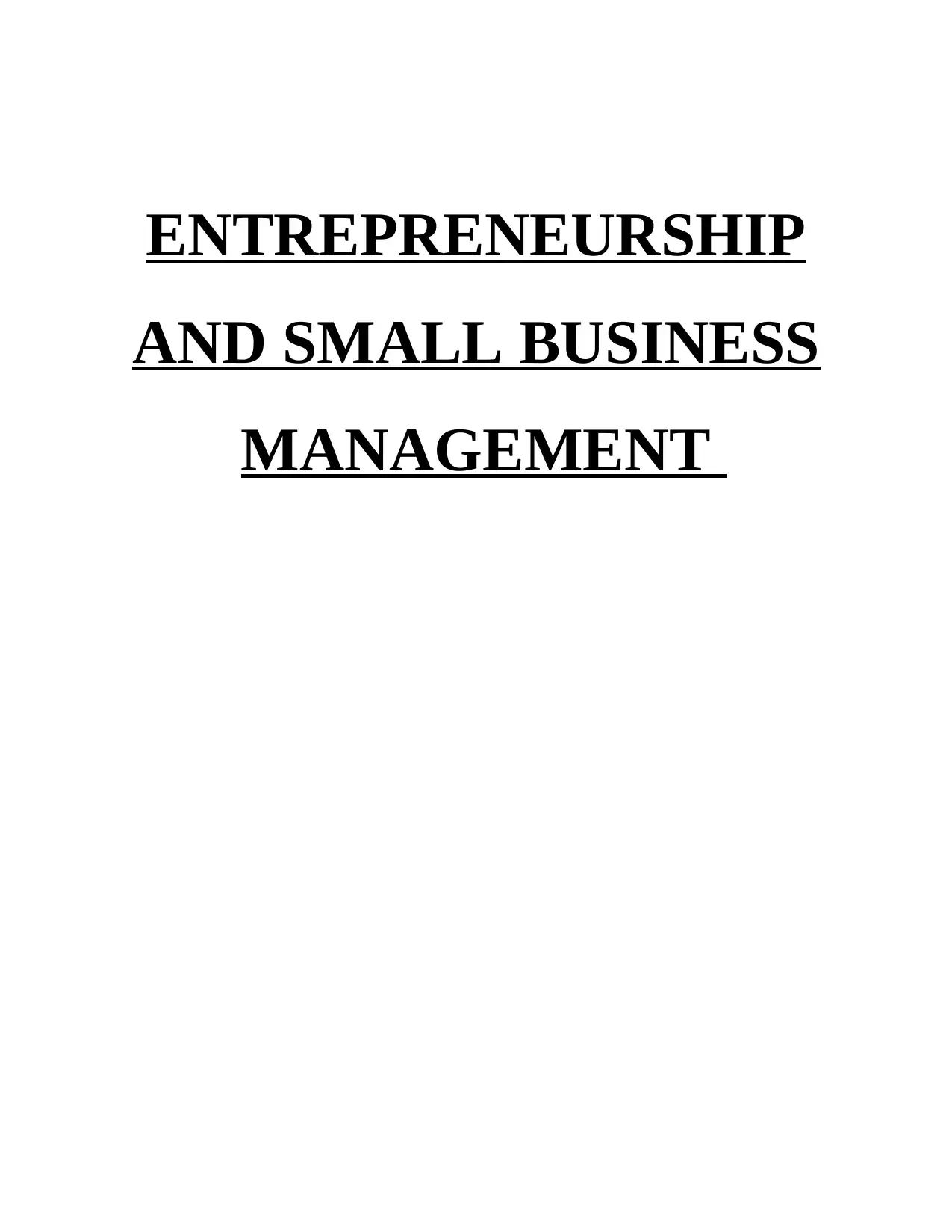
ENTREPRENEURSHIP
AND SMALL BUSINESS
MANAGEMENT
AND SMALL BUSINESS
MANAGEMENT
Paraphrase This Document
Need a fresh take? Get an instant paraphrase of this document with our AI Paraphraser
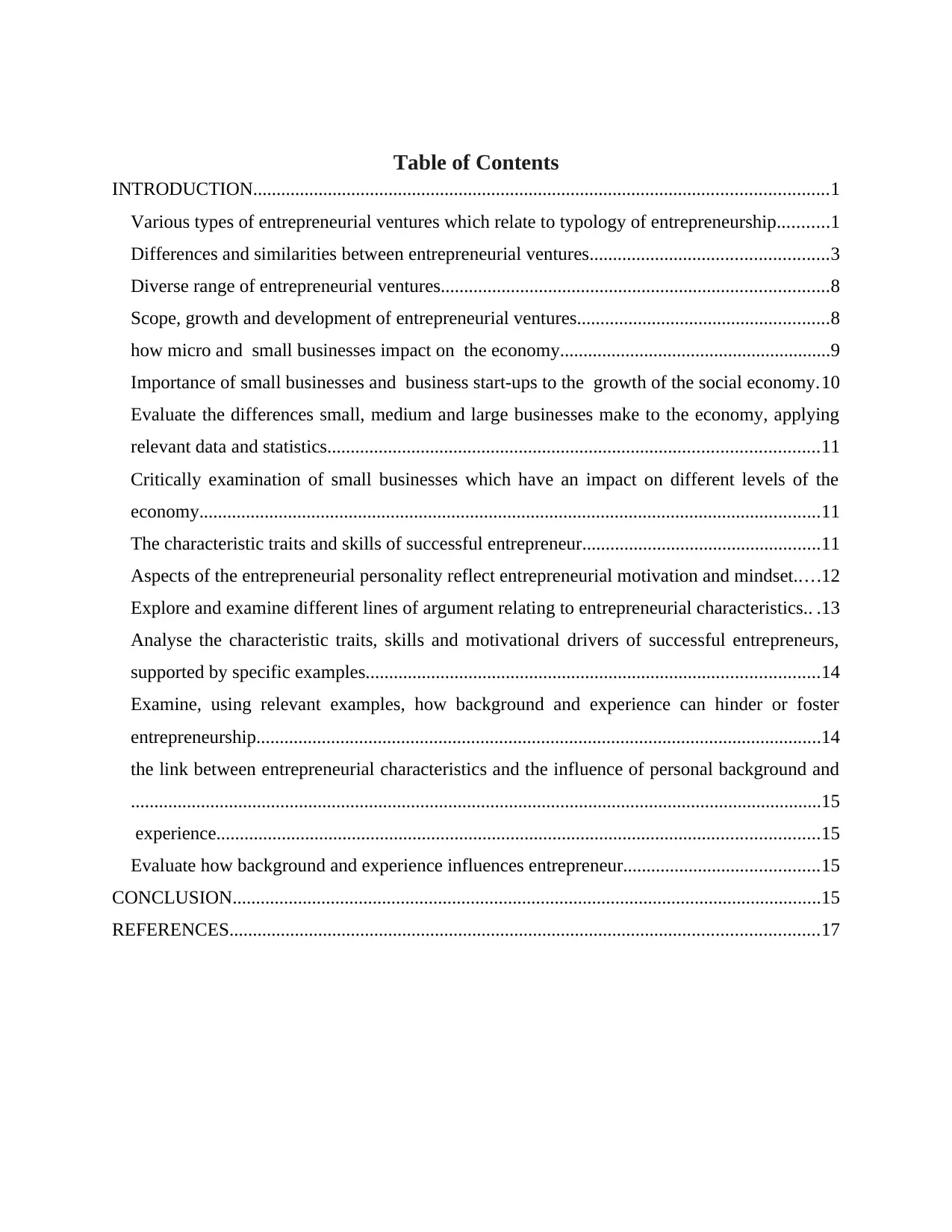
Table of Contents
INTRODUCTION...........................................................................................................................1
Various types of entrepreneurial ventures which relate to typology of entrepreneurship...........1
Differences and similarities between entrepreneurial ventures...................................................3
Diverse range of entrepreneurial ventures...................................................................................8
Scope, growth and development of entrepreneurial ventures......................................................8
how micro and small businesses impact on the economy..........................................................9
Importance of small businesses and business start-ups to the growth of the social economy.10
Evaluate the differences small, medium and large businesses make to the economy, applying
relevant data and statistics.........................................................................................................11
Critically examination of small businesses which have an impact on different levels of the
economy.....................................................................................................................................11
The characteristic traits and skills of successful entrepreneur...................................................11
Aspects of the entrepreneurial personality reflect entrepreneurial motivation and mindset.....12
Explore and examine different lines of argument relating to entrepreneurial characteristics.. .13
Analyse the characteristic traits, skills and motivational drivers of successful entrepreneurs,
supported by specific examples.................................................................................................14
Examine, using relevant examples, how background and experience can hinder or foster
entrepreneurship.........................................................................................................................14
the link between entrepreneurial characteristics and the influence of personal background and
....................................................................................................................................................15
experience.................................................................................................................................15
Evaluate how background and experience influences entrepreneur..........................................15
CONCLUSION..............................................................................................................................15
REFERENCES..............................................................................................................................17
INTRODUCTION...........................................................................................................................1
Various types of entrepreneurial ventures which relate to typology of entrepreneurship...........1
Differences and similarities between entrepreneurial ventures...................................................3
Diverse range of entrepreneurial ventures...................................................................................8
Scope, growth and development of entrepreneurial ventures......................................................8
how micro and small businesses impact on the economy..........................................................9
Importance of small businesses and business start-ups to the growth of the social economy.10
Evaluate the differences small, medium and large businesses make to the economy, applying
relevant data and statistics.........................................................................................................11
Critically examination of small businesses which have an impact on different levels of the
economy.....................................................................................................................................11
The characteristic traits and skills of successful entrepreneur...................................................11
Aspects of the entrepreneurial personality reflect entrepreneurial motivation and mindset.....12
Explore and examine different lines of argument relating to entrepreneurial characteristics.. .13
Analyse the characteristic traits, skills and motivational drivers of successful entrepreneurs,
supported by specific examples.................................................................................................14
Examine, using relevant examples, how background and experience can hinder or foster
entrepreneurship.........................................................................................................................14
the link between entrepreneurial characteristics and the influence of personal background and
....................................................................................................................................................15
experience.................................................................................................................................15
Evaluate how background and experience influences entrepreneur..........................................15
CONCLUSION..............................................................................................................................15
REFERENCES..............................................................................................................................17
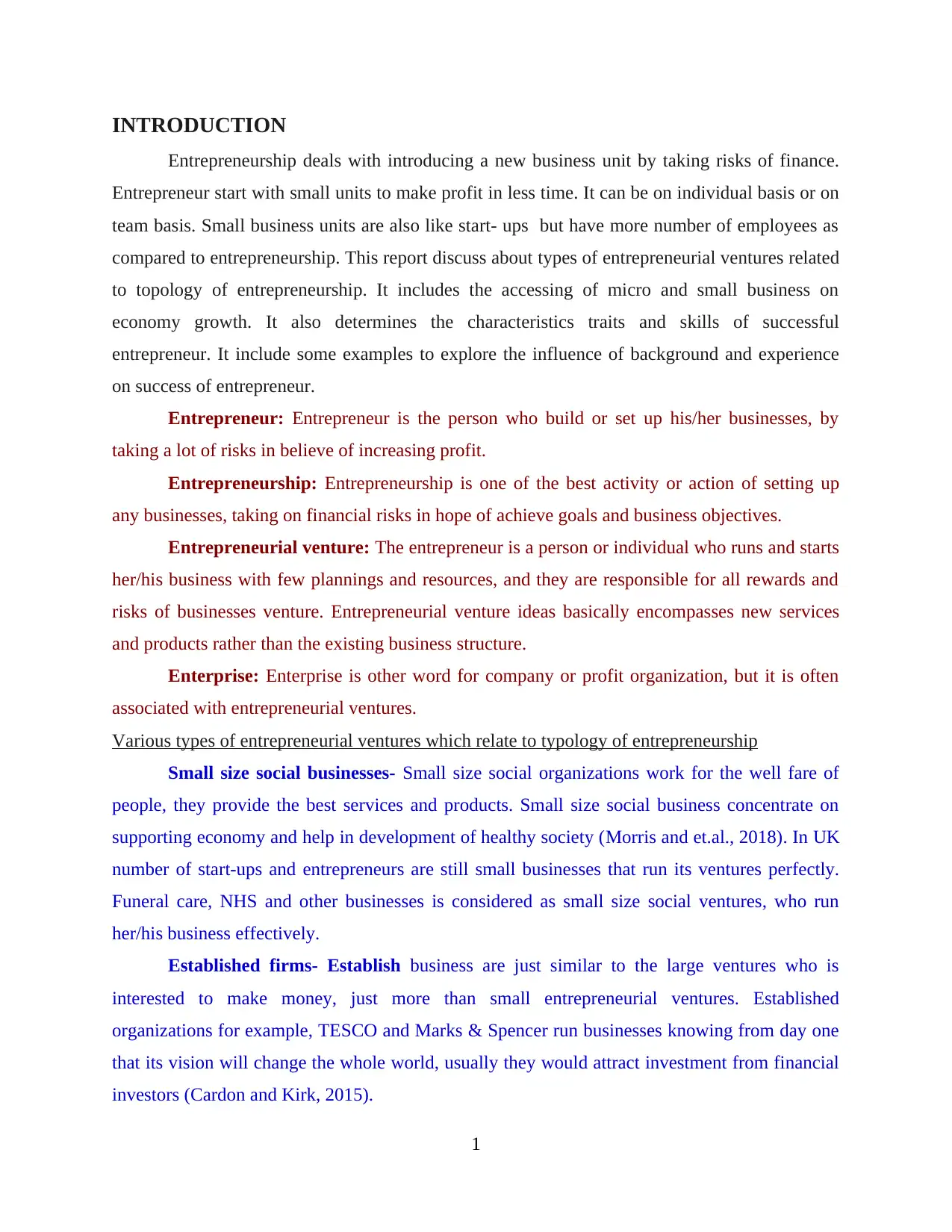
INTRODUCTION
Entrepreneurship deals with introducing a new business unit by taking risks of finance.
Entrepreneur start with small units to make profit in less time. It can be on individual basis or on
team basis. Small business units are also like start- ups but have more number of employees as
compared to entrepreneurship. This report discuss about types of entrepreneurial ventures related
to topology of entrepreneurship. It includes the accessing of micro and small business on
economy growth. It also determines the characteristics traits and skills of successful
entrepreneur. It include some examples to explore the influence of background and experience
on success of entrepreneur.
Entrepreneur: Entrepreneur is the person who build or set up his/her businesses, by
taking a lot of risks in believe of increasing profit.
Entrepreneurship: Entrepreneurship is one of the best activity or action of setting up
any businesses, taking on financial risks in hope of achieve goals and business objectives.
Entrepreneurial venture: The entrepreneur is a person or individual who runs and starts
her/his business with few plannings and resources, and they are responsible for all rewards and
risks of businesses venture. Entrepreneurial venture ideas basically encompasses new services
and products rather than the existing business structure.
Enterprise: Enterprise is other word for company or profit organization, but it is often
associated with entrepreneurial ventures.
Various types of entrepreneurial ventures which relate to typology of entrepreneurship
Small size social businesses- Small size social organizations work for the well fare of
people, they provide the best services and products. Small size social business concentrate on
supporting economy and help in development of healthy society (Morris and et.al., 2018). In UK
number of start-ups and entrepreneurs are still small businesses that run its ventures perfectly.
Funeral care, NHS and other businesses is considered as small size social ventures, who run
her/his business effectively.
Established firms- Establish business are just similar to the large ventures who is
interested to make money, just more than small entrepreneurial ventures. Established
organizations for example, TESCO and Marks & Spencer run businesses knowing from day one
that its vision will change the whole world, usually they would attract investment from financial
investors (Cardon and Kirk, 2015).
1
Entrepreneurship deals with introducing a new business unit by taking risks of finance.
Entrepreneur start with small units to make profit in less time. It can be on individual basis or on
team basis. Small business units are also like start- ups but have more number of employees as
compared to entrepreneurship. This report discuss about types of entrepreneurial ventures related
to topology of entrepreneurship. It includes the accessing of micro and small business on
economy growth. It also determines the characteristics traits and skills of successful
entrepreneur. It include some examples to explore the influence of background and experience
on success of entrepreneur.
Entrepreneur: Entrepreneur is the person who build or set up his/her businesses, by
taking a lot of risks in believe of increasing profit.
Entrepreneurship: Entrepreneurship is one of the best activity or action of setting up
any businesses, taking on financial risks in hope of achieve goals and business objectives.
Entrepreneurial venture: The entrepreneur is a person or individual who runs and starts
her/his business with few plannings and resources, and they are responsible for all rewards and
risks of businesses venture. Entrepreneurial venture ideas basically encompasses new services
and products rather than the existing business structure.
Enterprise: Enterprise is other word for company or profit organization, but it is often
associated with entrepreneurial ventures.
Various types of entrepreneurial ventures which relate to typology of entrepreneurship
Small size social businesses- Small size social organizations work for the well fare of
people, they provide the best services and products. Small size social business concentrate on
supporting economy and help in development of healthy society (Morris and et.al., 2018). In UK
number of start-ups and entrepreneurs are still small businesses that run its ventures perfectly.
Funeral care, NHS and other businesses is considered as small size social ventures, who run
her/his business effectively.
Established firms- Establish business are just similar to the large ventures who is
interested to make money, just more than small entrepreneurial ventures. Established
organizations for example, TESCO and Marks & Spencer run businesses knowing from day one
that its vision will change the whole world, usually they would attract investment from financial
investors (Cardon and Kirk, 2015).
1
⊘ This is a preview!⊘
Do you want full access?
Subscribe today to unlock all pages.

Trusted by 1+ million students worldwide
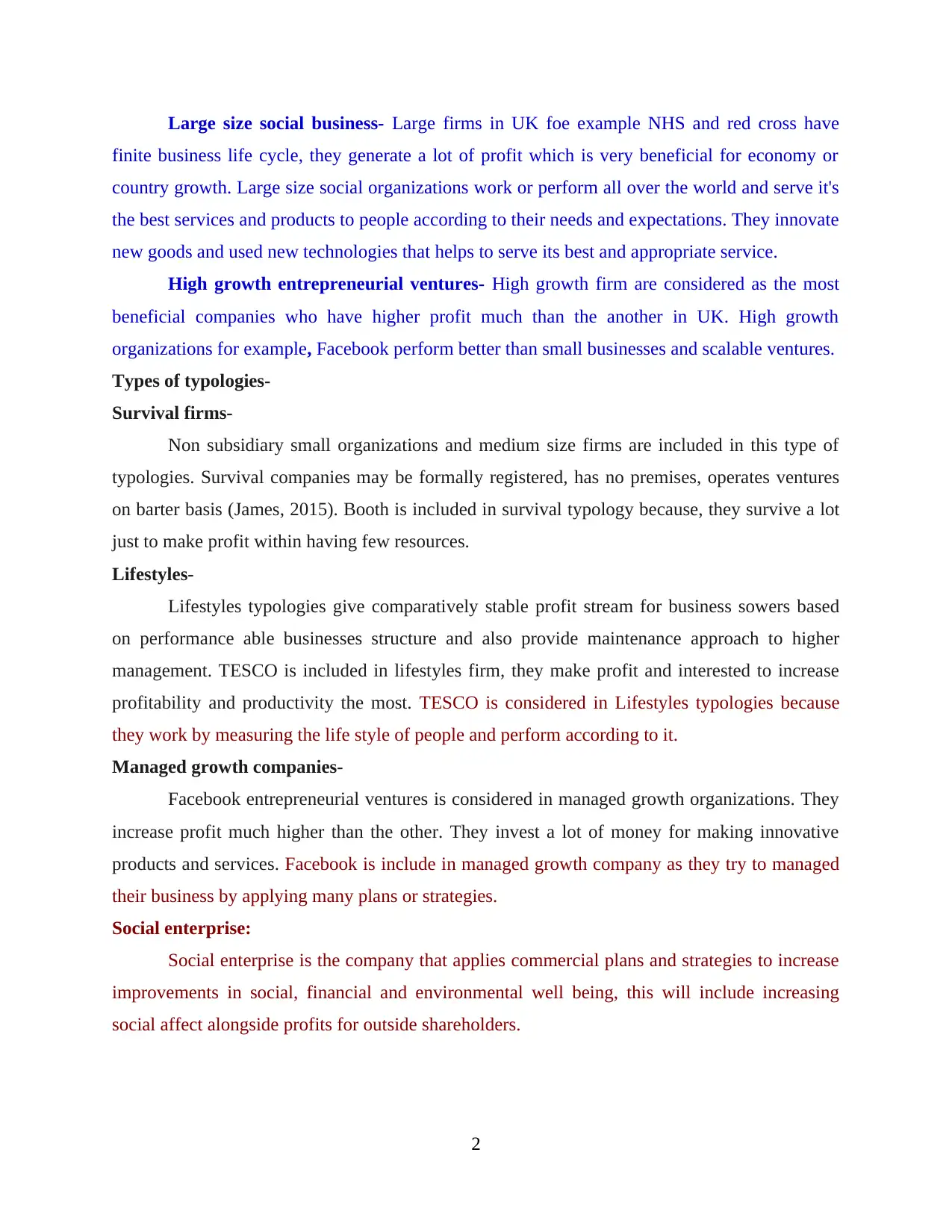
Large size social business- Large firms in UK foe example NHS and red cross have
finite business life cycle, they generate a lot of profit which is very beneficial for economy or
country growth. Large size social organizations work or perform all over the world and serve it's
the best services and products to people according to their needs and expectations. They innovate
new goods and used new technologies that helps to serve its best and appropriate service.
High growth entrepreneurial ventures- High growth firm are considered as the most
beneficial companies who have higher profit much than the another in UK. High growth
organizations for example, Facebook perform better than small businesses and scalable ventures.
Types of typologies-
Survival firms-
Non subsidiary small organizations and medium size firms are included in this type of
typologies. Survival companies may be formally registered, has no premises, operates ventures
on barter basis (James, 2015). Booth is included in survival typology because, they survive a lot
just to make profit within having few resources.
Lifestyles-
Lifestyles typologies give comparatively stable profit stream for business sowers based
on performance able businesses structure and also provide maintenance approach to higher
management. TESCO is included in lifestyles firm, they make profit and interested to increase
profitability and productivity the most. TESCO is considered in Lifestyles typologies because
they work by measuring the life style of people and perform according to it.
Managed growth companies-
Facebook entrepreneurial ventures is considered in managed growth organizations. They
increase profit much higher than the other. They invest a lot of money for making innovative
products and services. Facebook is include in managed growth company as they try to managed
their business by applying many plans or strategies.
Social enterprise:
Social enterprise is the company that applies commercial plans and strategies to increase
improvements in social, financial and environmental well being, this will include increasing
social affect alongside profits for outside shareholders.
2
finite business life cycle, they generate a lot of profit which is very beneficial for economy or
country growth. Large size social organizations work or perform all over the world and serve it's
the best services and products to people according to their needs and expectations. They innovate
new goods and used new technologies that helps to serve its best and appropriate service.
High growth entrepreneurial ventures- High growth firm are considered as the most
beneficial companies who have higher profit much than the another in UK. High growth
organizations for example, Facebook perform better than small businesses and scalable ventures.
Types of typologies-
Survival firms-
Non subsidiary small organizations and medium size firms are included in this type of
typologies. Survival companies may be formally registered, has no premises, operates ventures
on barter basis (James, 2015). Booth is included in survival typology because, they survive a lot
just to make profit within having few resources.
Lifestyles-
Lifestyles typologies give comparatively stable profit stream for business sowers based
on performance able businesses structure and also provide maintenance approach to higher
management. TESCO is included in lifestyles firm, they make profit and interested to increase
profitability and productivity the most. TESCO is considered in Lifestyles typologies because
they work by measuring the life style of people and perform according to it.
Managed growth companies-
Facebook entrepreneurial ventures is considered in managed growth organizations. They
increase profit much higher than the other. They invest a lot of money for making innovative
products and services. Facebook is include in managed growth company as they try to managed
their business by applying many plans or strategies.
Social enterprise:
Social enterprise is the company that applies commercial plans and strategies to increase
improvements in social, financial and environmental well being, this will include increasing
social affect alongside profits for outside shareholders.
2
Paraphrase This Document
Need a fresh take? Get an instant paraphrase of this document with our AI Paraphraser
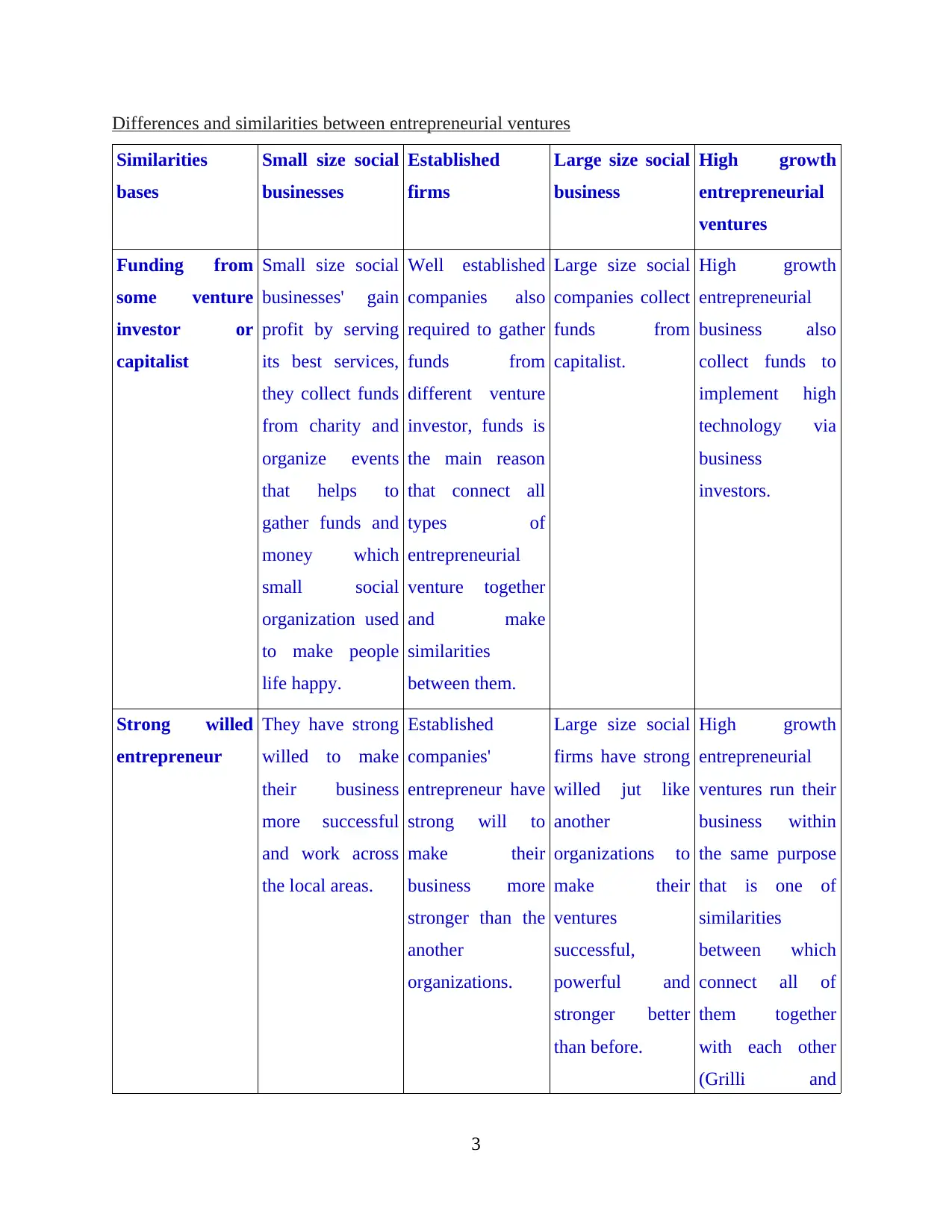
Differences and similarities between entrepreneurial ventures
Similarities
bases
Small size social
businesses
Established
firms
Large size social
business
High growth
entrepreneurial
ventures
Funding from
some venture
investor or
capitalist
Small size social
businesses' gain
profit by serving
its best services,
they collect funds
from charity and
organize events
that helps to
gather funds and
money which
small social
organization used
to make people
life happy.
Well established
companies also
required to gather
funds from
different venture
investor, funds is
the main reason
that connect all
types of
entrepreneurial
venture together
and make
similarities
between them.
Large size social
companies collect
funds from
capitalist.
High growth
entrepreneurial
business also
collect funds to
implement high
technology via
business
investors.
Strong willed
entrepreneur
They have strong
willed to make
their business
more successful
and work across
the local areas.
Established
companies'
entrepreneur have
strong will to
make their
business more
stronger than the
another
organizations.
Large size social
firms have strong
willed jut like
another
organizations to
make their
ventures
successful,
powerful and
stronger better
than before.
High growth
entrepreneurial
ventures run their
business within
the same purpose
that is one of
similarities
between which
connect all of
them together
with each other
(Grilli and
3
Similarities
bases
Small size social
businesses
Established
firms
Large size social
business
High growth
entrepreneurial
ventures
Funding from
some venture
investor or
capitalist
Small size social
businesses' gain
profit by serving
its best services,
they collect funds
from charity and
organize events
that helps to
gather funds and
money which
small social
organization used
to make people
life happy.
Well established
companies also
required to gather
funds from
different venture
investor, funds is
the main reason
that connect all
types of
entrepreneurial
venture together
and make
similarities
between them.
Large size social
companies collect
funds from
capitalist.
High growth
entrepreneurial
business also
collect funds to
implement high
technology via
business
investors.
Strong willed
entrepreneur
They have strong
willed to make
their business
more successful
and work across
the local areas.
Established
companies'
entrepreneur have
strong will to
make their
business more
stronger than the
another
organizations.
Large size social
firms have strong
willed jut like
another
organizations to
make their
ventures
successful,
powerful and
stronger better
than before.
High growth
entrepreneurial
ventures run their
business within
the same purpose
that is one of
similarities
between which
connect all of
them together
with each other
(Grilli and
3
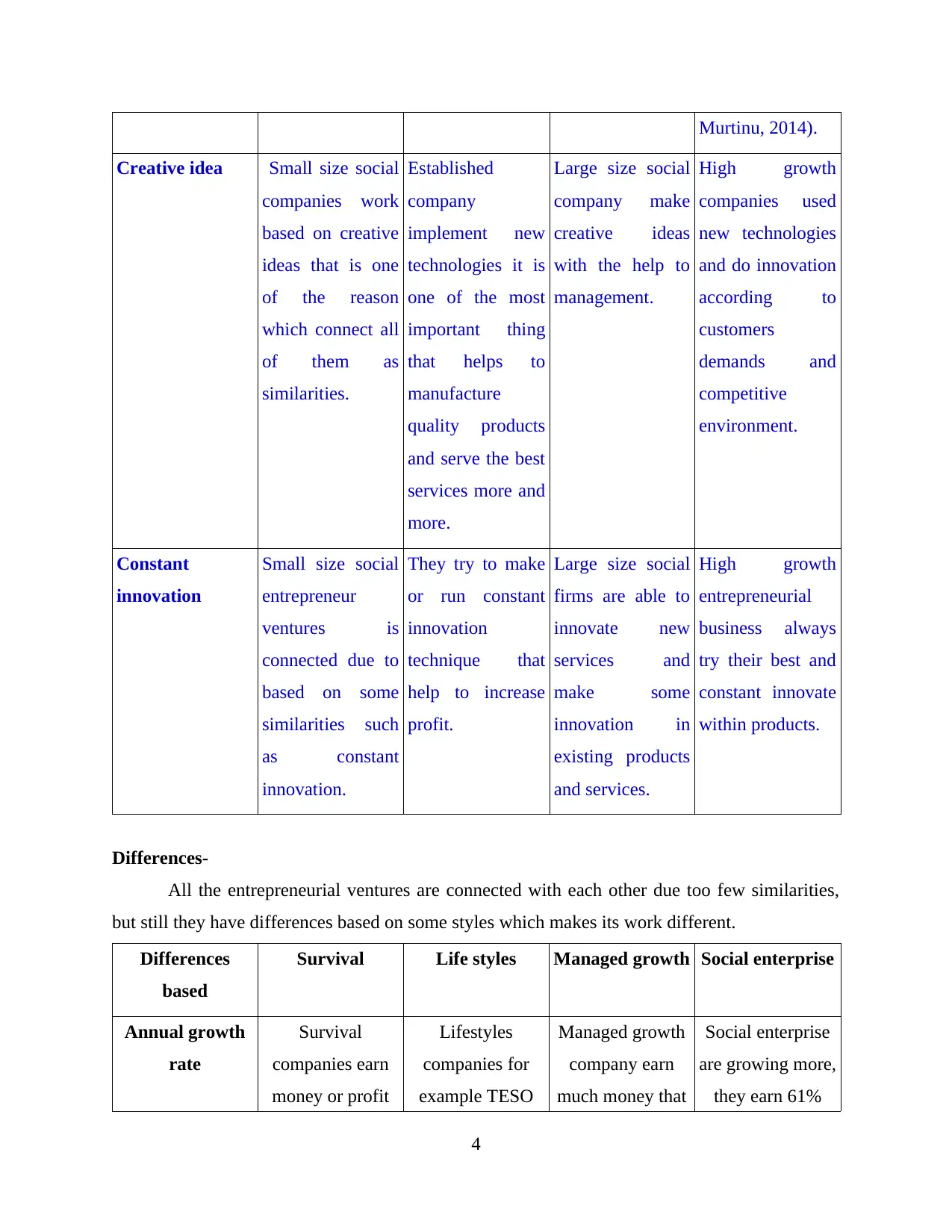
Murtinu, 2014).
Creative idea Small size social
companies work
based on creative
ideas that is one
of the reason
which connect all
of them as
similarities.
Established
company
implement new
technologies it is
one of the most
important thing
that helps to
manufacture
quality products
and serve the best
services more and
more.
Large size social
company make
creative ideas
with the help to
management.
High growth
companies used
new technologies
and do innovation
according to
customers
demands and
competitive
environment.
Constant
innovation
Small size social
entrepreneur
ventures is
connected due to
based on some
similarities such
as constant
innovation.
They try to make
or run constant
innovation
technique that
help to increase
profit.
Large size social
firms are able to
innovate new
services and
make some
innovation in
existing products
and services.
High growth
entrepreneurial
business always
try their best and
constant innovate
within products.
Differences-
All the entrepreneurial ventures are connected with each other due too few similarities,
but still they have differences based on some styles which makes its work different.
Differences
based
Survival Life styles Managed growth Social enterprise
Annual growth
rate
Survival
companies earn
money or profit
Lifestyles
companies for
example TESO
Managed growth
company earn
much money that
Social enterprise
are growing more,
they earn 61%
4
Creative idea Small size social
companies work
based on creative
ideas that is one
of the reason
which connect all
of them as
similarities.
Established
company
implement new
technologies it is
one of the most
important thing
that helps to
manufacture
quality products
and serve the best
services more and
more.
Large size social
company make
creative ideas
with the help to
management.
High growth
companies used
new technologies
and do innovation
according to
customers
demands and
competitive
environment.
Constant
innovation
Small size social
entrepreneur
ventures is
connected due to
based on some
similarities such
as constant
innovation.
They try to make
or run constant
innovation
technique that
help to increase
profit.
Large size social
firms are able to
innovate new
services and
make some
innovation in
existing products
and services.
High growth
entrepreneurial
business always
try their best and
constant innovate
within products.
Differences-
All the entrepreneurial ventures are connected with each other due too few similarities,
but still they have differences based on some styles which makes its work different.
Differences
based
Survival Life styles Managed growth Social enterprise
Annual growth
rate
Survival
companies earn
money or profit
Lifestyles
companies for
example TESO
Managed growth
company earn
much money that
Social enterprise
are growing more,
they earn 61%
4
⊘ This is a preview!⊘
Do you want full access?
Subscribe today to unlock all pages.

Trusted by 1+ million students worldwide
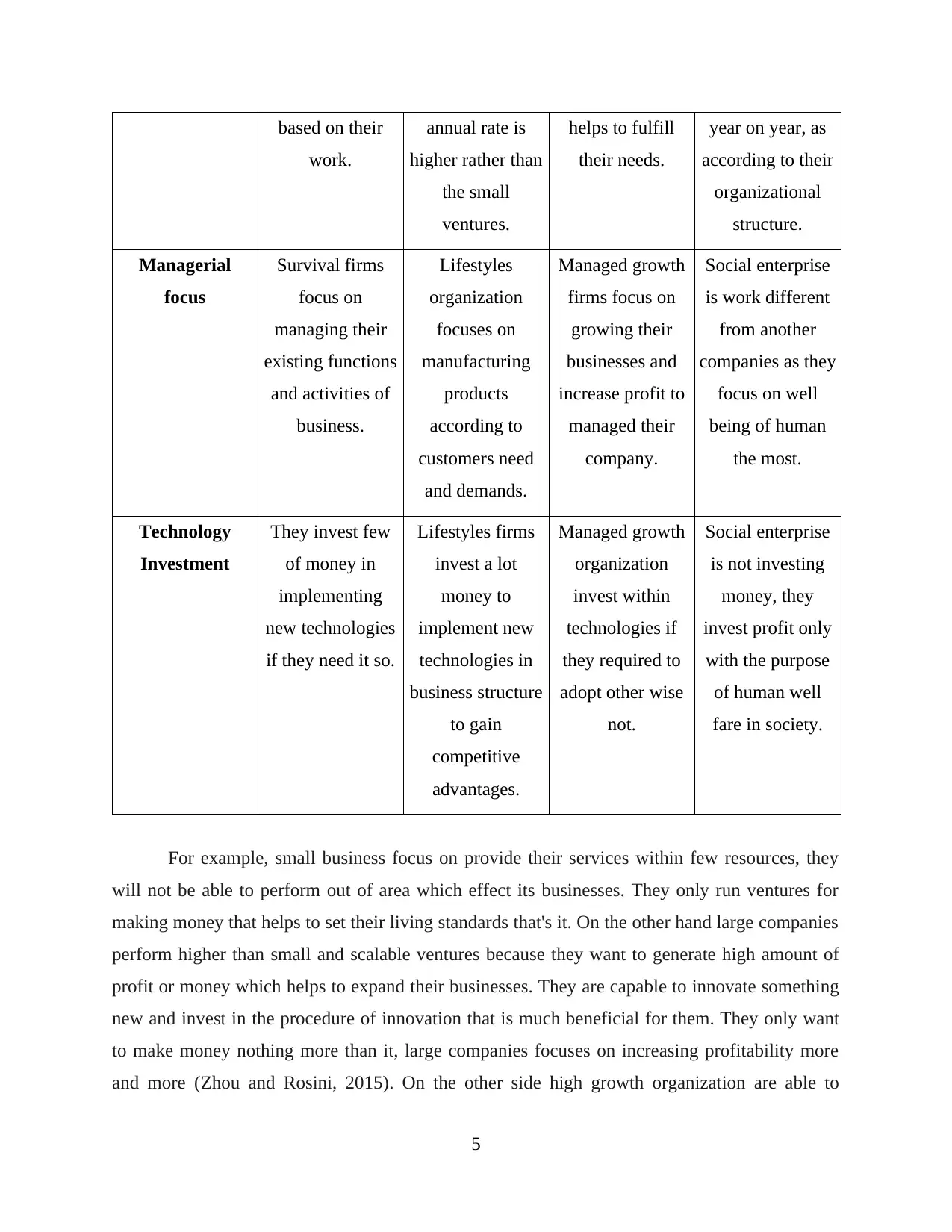
based on their
work.
annual rate is
higher rather than
the small
ventures.
helps to fulfill
their needs.
year on year, as
according to their
organizational
structure.
Managerial
focus
Survival firms
focus on
managing their
existing functions
and activities of
business.
Lifestyles
organization
focuses on
manufacturing
products
according to
customers need
and demands.
Managed growth
firms focus on
growing their
businesses and
increase profit to
managed their
company.
Social enterprise
is work different
from another
companies as they
focus on well
being of human
the most.
Technology
Investment
They invest few
of money in
implementing
new technologies
if they need it so.
Lifestyles firms
invest a lot
money to
implement new
technologies in
business structure
to gain
competitive
advantages.
Managed growth
organization
invest within
technologies if
they required to
adopt other wise
not.
Social enterprise
is not investing
money, they
invest profit only
with the purpose
of human well
fare in society.
For example, small business focus on provide their services within few resources, they
will not be able to perform out of area which effect its businesses. They only run ventures for
making money that helps to set their living standards that's it. On the other hand large companies
perform higher than small and scalable ventures because they want to generate high amount of
profit or money which helps to expand their businesses. They are capable to innovate something
new and invest in the procedure of innovation that is much beneficial for them. They only want
to make money nothing more than it, large companies focuses on increasing profitability more
and more (Zhou and Rosini, 2015). On the other side high growth organization are able to
5
work.
annual rate is
higher rather than
the small
ventures.
helps to fulfill
their needs.
year on year, as
according to their
organizational
structure.
Managerial
focus
Survival firms
focus on
managing their
existing functions
and activities of
business.
Lifestyles
organization
focuses on
manufacturing
products
according to
customers need
and demands.
Managed growth
firms focus on
growing their
businesses and
increase profit to
managed their
company.
Social enterprise
is work different
from another
companies as they
focus on well
being of human
the most.
Technology
Investment
They invest few
of money in
implementing
new technologies
if they need it so.
Lifestyles firms
invest a lot
money to
implement new
technologies in
business structure
to gain
competitive
advantages.
Managed growth
organization
invest within
technologies if
they required to
adopt other wise
not.
Social enterprise
is not investing
money, they
invest profit only
with the purpose
of human well
fare in society.
For example, small business focus on provide their services within few resources, they
will not be able to perform out of area which effect its businesses. They only run ventures for
making money that helps to set their living standards that's it. On the other hand large companies
perform higher than small and scalable ventures because they want to generate high amount of
profit or money which helps to expand their businesses. They are capable to innovate something
new and invest in the procedure of innovation that is much beneficial for them. They only want
to make money nothing more than it, large companies focuses on increasing profitability more
and more (Zhou and Rosini, 2015). On the other side high growth organization are able to
5
Paraphrase This Document
Need a fresh take? Get an instant paraphrase of this document with our AI Paraphraser
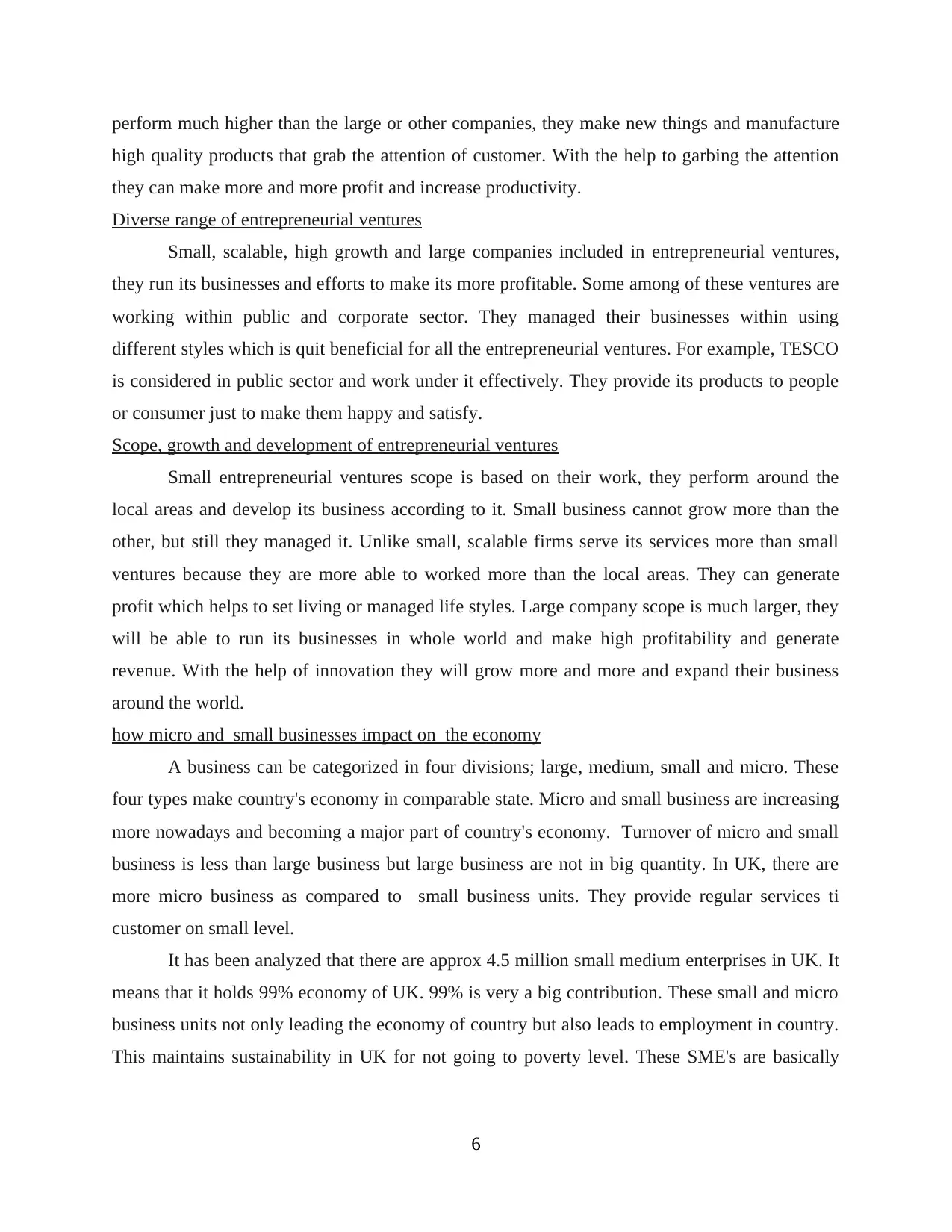
perform much higher than the large or other companies, they make new things and manufacture
high quality products that grab the attention of customer. With the help to garbing the attention
they can make more and more profit and increase productivity.
Diverse range of entrepreneurial ventures
Small, scalable, high growth and large companies included in entrepreneurial ventures,
they run its businesses and efforts to make its more profitable. Some among of these ventures are
working within public and corporate sector. They managed their businesses within using
different styles which is quit beneficial for all the entrepreneurial ventures. For example, TESCO
is considered in public sector and work under it effectively. They provide its products to people
or consumer just to make them happy and satisfy.
Scope, growth and development of entrepreneurial ventures
Small entrepreneurial ventures scope is based on their work, they perform around the
local areas and develop its business according to it. Small business cannot grow more than the
other, but still they managed it. Unlike small, scalable firms serve its services more than small
ventures because they are more able to worked more than the local areas. They can generate
profit which helps to set living or managed life styles. Large company scope is much larger, they
will be able to run its businesses in whole world and make high profitability and generate
revenue. With the help of innovation they will grow more and more and expand their business
around the world.
how micro and small businesses impact on the economy
A business can be categorized in four divisions; large, medium, small and micro. These
four types make country's economy in comparable state. Micro and small business are increasing
more nowadays and becoming a major part of country's economy. Turnover of micro and small
business is less than large business but large business are not in big quantity. In UK, there are
more micro business as compared to small business units. They provide regular services ti
customer on small level.
It has been analyzed that there are approx 4.5 million small medium enterprises in UK. It
means that it holds 99% economy of UK. 99% is very a big contribution. These small and micro
business units not only leading the economy of country but also leads to employment in country.
This maintains sustainability in UK for not going to poverty level. These SME's are basically
6
high quality products that grab the attention of customer. With the help to garbing the attention
they can make more and more profit and increase productivity.
Diverse range of entrepreneurial ventures
Small, scalable, high growth and large companies included in entrepreneurial ventures,
they run its businesses and efforts to make its more profitable. Some among of these ventures are
working within public and corporate sector. They managed their businesses within using
different styles which is quit beneficial for all the entrepreneurial ventures. For example, TESCO
is considered in public sector and work under it effectively. They provide its products to people
or consumer just to make them happy and satisfy.
Scope, growth and development of entrepreneurial ventures
Small entrepreneurial ventures scope is based on their work, they perform around the
local areas and develop its business according to it. Small business cannot grow more than the
other, but still they managed it. Unlike small, scalable firms serve its services more than small
ventures because they are more able to worked more than the local areas. They can generate
profit which helps to set living or managed life styles. Large company scope is much larger, they
will be able to run its businesses in whole world and make high profitability and generate
revenue. With the help of innovation they will grow more and more and expand their business
around the world.
how micro and small businesses impact on the economy
A business can be categorized in four divisions; large, medium, small and micro. These
four types make country's economy in comparable state. Micro and small business are increasing
more nowadays and becoming a major part of country's economy. Turnover of micro and small
business is less than large business but large business are not in big quantity. In UK, there are
more micro business as compared to small business units. They provide regular services ti
customer on small level.
It has been analyzed that there are approx 4.5 million small medium enterprises in UK. It
means that it holds 99% economy of UK. 99% is very a big contribution. These small and micro
business units not only leading the economy of country but also leads to employment in country.
This maintains sustainability in UK for not going to poverty level. These SME's are basically
6
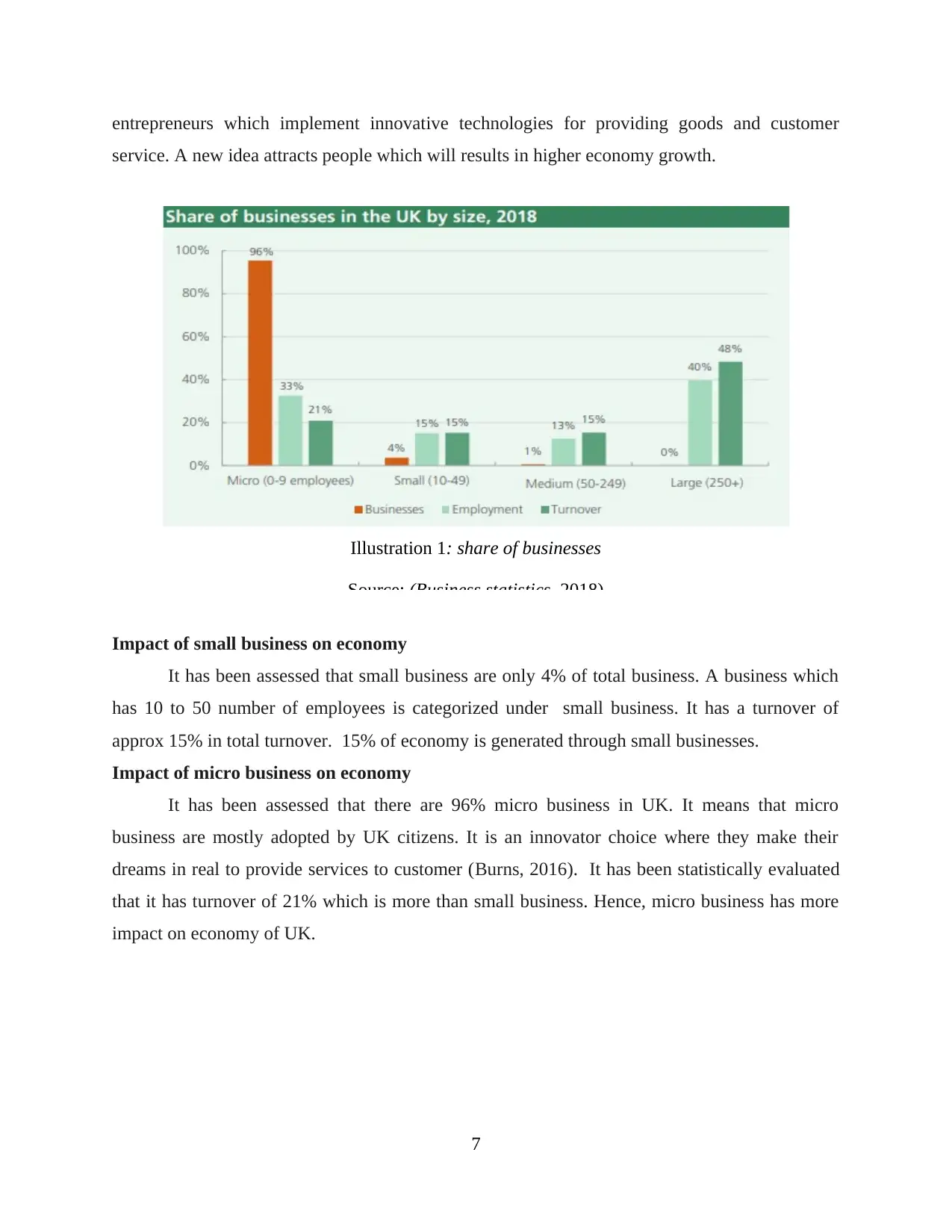
entrepreneurs which implement innovative technologies for providing goods and customer
service. A new idea attracts people which will results in higher economy growth.
Impact of small business on economy
It has been assessed that small business are only 4% of total business. A business which
has 10 to 50 number of employees is categorized under small business. It has a turnover of
approx 15% in total turnover. 15% of economy is generated through small businesses.
Impact of micro business on economy
It has been assessed that there are 96% micro business in UK. It means that micro
business are mostly adopted by UK citizens. It is an innovator choice where they make their
dreams in real to provide services to customer (Burns, 2016). It has been statistically evaluated
that it has turnover of 21% which is more than small business. Hence, micro business has more
impact on economy of UK.
7
Illustration 1: share of businesses
Source: (Business statistics, 2018)
service. A new idea attracts people which will results in higher economy growth.
Impact of small business on economy
It has been assessed that small business are only 4% of total business. A business which
has 10 to 50 number of employees is categorized under small business. It has a turnover of
approx 15% in total turnover. 15% of economy is generated through small businesses.
Impact of micro business on economy
It has been assessed that there are 96% micro business in UK. It means that micro
business are mostly adopted by UK citizens. It is an innovator choice where they make their
dreams in real to provide services to customer (Burns, 2016). It has been statistically evaluated
that it has turnover of 21% which is more than small business. Hence, micro business has more
impact on economy of UK.
7
Illustration 1: share of businesses
Source: (Business statistics, 2018)
⊘ This is a preview!⊘
Do you want full access?
Subscribe today to unlock all pages.

Trusted by 1+ million students worldwide

Private sector within UK provide employment opportunities to residential people, they try
to improve position of economy and develop it more than before. 99.9 percent of UK businesses
classed as small and medium size companies, they hire 249 employees.
8
to improve position of economy and develop it more than before. 99.9 percent of UK businesses
classed as small and medium size companies, they hire 249 employees.
8
Paraphrase This Document
Need a fresh take? Get an instant paraphrase of this document with our AI Paraphraser
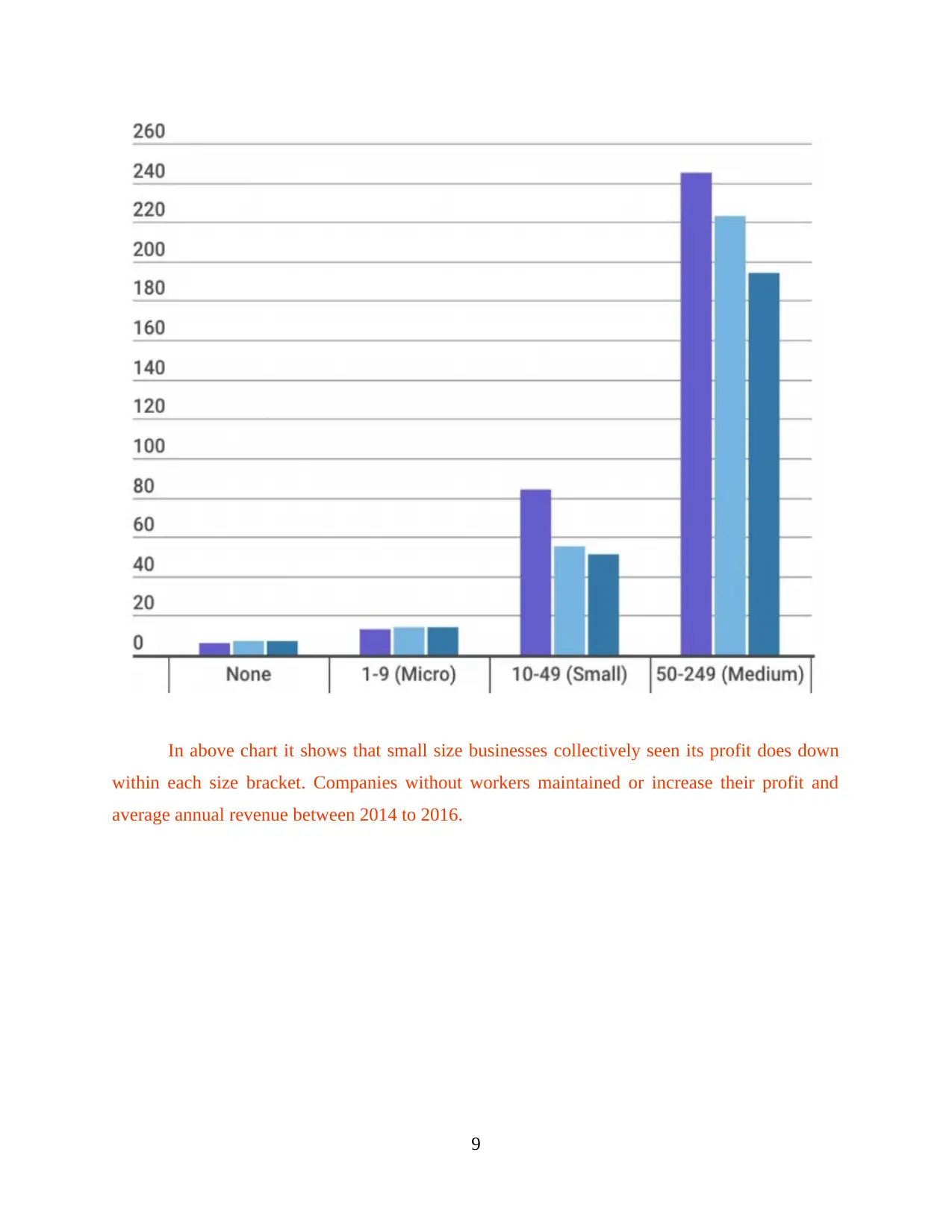
In above chart it shows that small size businesses collectively seen its profit does down
within each size bracket. Companies without workers maintained or increase their profit and
average annual revenue between 2014 to 2016.
9
within each size bracket. Companies without workers maintained or increase their profit and
average annual revenue between 2014 to 2016.
9
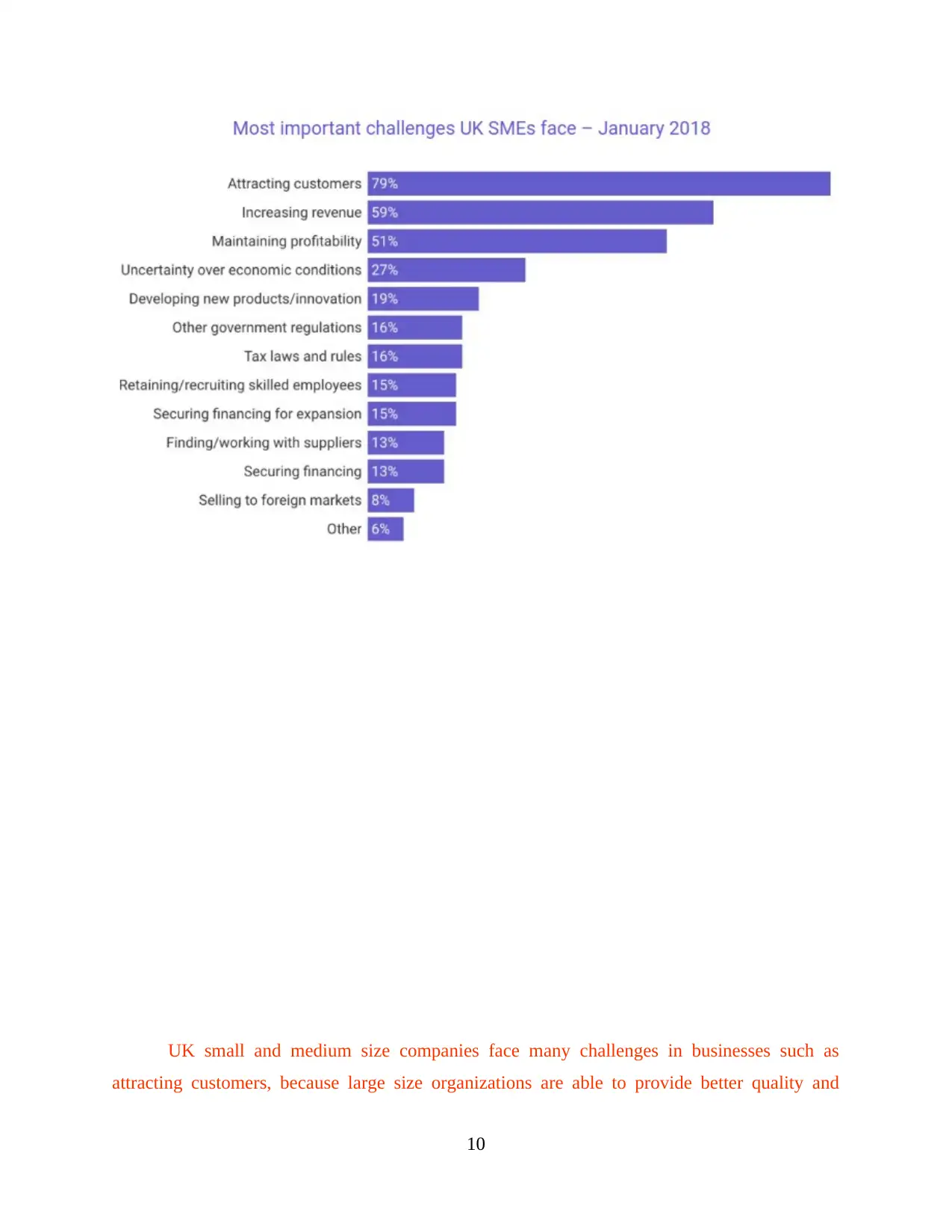
UK small and medium size companies face many challenges in businesses such as
attracting customers, because large size organizations are able to provide better quality and
10
attracting customers, because large size organizations are able to provide better quality and
10
⊘ This is a preview!⊘
Do you want full access?
Subscribe today to unlock all pages.

Trusted by 1+ million students worldwide
1 out of 19
Related Documents
Your All-in-One AI-Powered Toolkit for Academic Success.
+13062052269
info@desklib.com
Available 24*7 on WhatsApp / Email
![[object Object]](/_next/static/media/star-bottom.7253800d.svg)
Unlock your academic potential
Copyright © 2020–2025 A2Z Services. All Rights Reserved. Developed and managed by ZUCOL.


